What are those “Levels” of Inspection?

,
Leslie Lovre, Technical Assistant to R. Scott King, BSME ::::
A police report has long been among the first documents generated in a commercial vehicle crash investigation and reconstruction. In fact, in our office the first item in each file’s document inventory list is typically reserved for the police report. In addition to identifying the date, time, location, and parties involved, commercial vehicle crash investigation reports also often include detailed information related to the mechanical aspects of the commercial vehicle, as well as its driver. The data reflected in this section of the report normally follows a standard format, making specific reference to a certain “Level” of inspection criteria applied during the inspection. From time to time, clients have made specific requests for our engineers and investigators to apply that same “Level” of inspection noted within the police report, during our independent commercial vehicle forensic examination. Despite these specific requests, however, we have noted that many making the request often are not familiar with the details and applicability of the various inspection “levels” common to commercial vehicle investigations.
The Commercial Vehicle Safety Alliance (CVSA) is a non-profit organization of federal, state, and local authorities, as well as trucking industry professionals, whose purpose is to promote safety through developing inspection standards for commercial vehicles and their operators.
Through their efforts, the CVSA has developed six different “Levels” of inspection criteria, as follows:
LEVEL I– North American Standard Inspection
This inspection, perhaps the most common and comprehensive of all, evaluates both the commercial vehicle and its driver. Driver examination includes, among others, licenses, medical certificate, Skill Performance Evaluation, drug and alcohol checks, duty status, and hours of service. The mechanical aspect focuses on primary vehicle systems such as steering, tires, lights, and fuel and exhaust systems. This is also the level of inspection that generates the oft-cited references to braking adjustment measurements.
LEVEL II – Walk-Around Driver/Vehicle Inspection
The language of the Level II inspection criteria specifically cites all of the elements of the Level I inspection with the caveat that only items that can be inspected without going beneath the vehicle are included. For this reason, brake adjustment measurements are normally not included in the Level II inspection.
LEVEL III – Driver/Credential Inspection
Focusing only on the driver, this inspection includes, among others, licenses, medical certificate, Skill Performance Evaluation, drug and alcohol checks, duty status, and hours of service.
Level IV – Special Inspections
Such an inspection generally focuses on a specific item. As an example, the CVSA sponsors an annual “Brake Check” wherein thousands of commercial vehicles are randomly inspected to evaluate their brake systems. Data from these events help industry experts identify potential trends in vehicle maintenance deficiencies.
LEVEL V – Vehicle-Only Inspections
This inspection includes all of the vehicle elements specified in the Level I examination, but can be performed at any location and without the driver present.
LEVEL VI – North American Standard Inspection for Transuranic Waste and Highway Route Controlled Quantities (HRCQ) of Radioactive Material
As might be suspected, this inspection level relates to radiologic shipments and includes enhancements to the Level I criteria, above. All vehicle and carriers of HRCQ of radioactive material are subject to this Inspection Level.
Although our engineers and investigators can, when requested, respond rapidly to a commercial vehicle incident scene, most of their vehicle documentation work occurs after the scene is cleared, vehicles are relocated, and drivers are not present. For this reason, when our clients request a mechanical evaluation of a commercial vehicle, it is typically the Level V inspection they are requesting.
For additional information, please contact Leslie Lovre, Technical Assistant to R. Scott King, BSME, at 215-659-2010 or via email at lel@forensicDJS.com.
Tags: Leslie Lovre | R. Scott King | Vehicle Inspection


